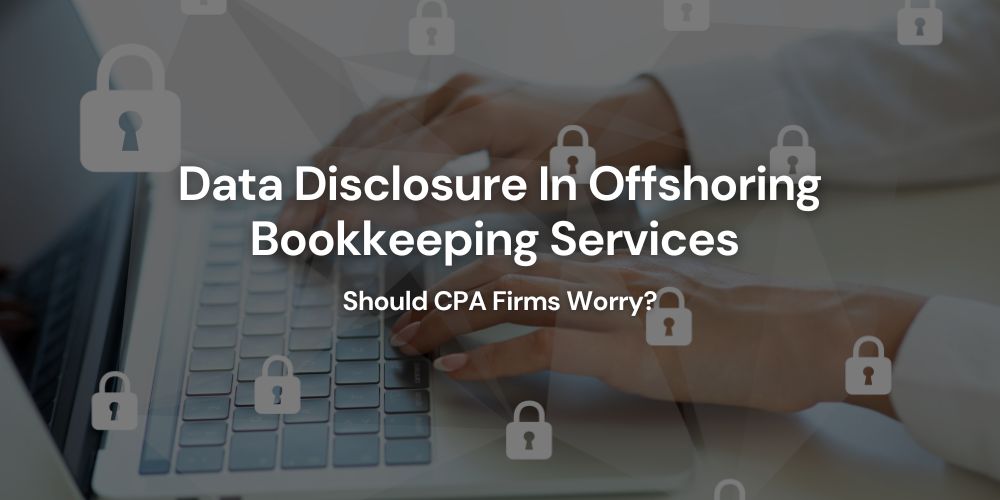Data Security Concerns When Offshoring Bookkeeping Services


The accounting and bookkeeping industry has experienced a significant transformation over the past few decades, with advancements in technology and globalization playing pivotal roles. One major development that has gained traction in recent years is the offshoring of bookkeeping services by Certified Public Accountants (CPAs). While this practice has provided several benefits, it has also raised concerns about the security and confidentiality of clients’ sensitive financial information. In this article, we will explore the CPA industry’s increasing reliance on offshoring bookkeeping services, delve into the worries regarding data disclosure, and assess whether these concerns are justified.
The Rise of Offshoring Bookkeeping in the CPA Firms
The accounting and bookkeeping profession has seen a significant shift in recent years, moving from traditional in-house practices to more efficient, cost-effective, and technologically advanced methods. One of the most notable changes is the growing trend of offshoring bookkeeping services by CPAs and accounting firms. Offshoring involves delegating certain tasks or processes to third-party service providers located in different countries, often with lower labor costs.
This transformation is driven by several factors:
- Cost Efficiency: Offshoring allows CPAs and accounting firms to reduce operational costs, as they can access a skilled and affordable labor force in countries with a lower cost of living.
- Specialized Expertise: Offshore professionals often possess specialized expertise in tax regulations, accounting principles, and software systems, enabling them to handle complex financial tasks efficiently.
- Scalability: Offshoring services provide CPAs with the flexibility to scale their operations up or down as per the demands of their clients.
- Focus on Core Services: By outsourcing routine bookkeeping tasks, CPAs can concentrate on providing higher-value services like financial planning and strategic tax consulting.
- Advanced Technology: Offshore service providers are often equipped with state-of-the-art technology and software, ensuring greater efficiency and accuracy.
Read more: How Bookkeeping Services Can Help CPA Firms Improve Productivity
The Concerns Surrounding Data Security
While offshoring bookkeeping services can offer numerous advantages, it has also raised concerns about the security and privacy of clients’ sensitive financial data. These concerns are legitimate and warrant careful consideration. Some of the major apprehensions include:
- Data Breaches: Outsourcing service providers may not adhere to the same stringent data protection regulations as those in the client’s home country, potentially exposing client data to a higher risk of cyberattacks and data breaches.
- Lack of Control: When offshoring bookkeeping services, CPAs have limited control over how the data is managed, stored, and secured, which can lead to vulnerabilities in the security of the data.
- Compliance with Regulations: Different countries have distinct laws and regulations regarding data protection and privacy. Ensuring compliance with these regulations can be challenging when offshoring bookkeeping services.
- Confidentiality Concerns: Clients often expect their financial information to remain confidential. Any breach of this confidentiality can result in a loss of trust and reputation damage for CPAs and accounting firms.
- Cultural and Language Differences: Working with professionals from different cultures and languages can lead to misunderstandings, which could potentially compromise the accuracy and security of financial data.
Addressing the Data Security Concerns When Offshoring Bookkeeping Services
Despite the valid concerns regarding data disclosure in offshoring bookkeeping services, it is essential to recognize that many CPAs and accounting firms successfully mitigate these risks. They do so by implementing robust strategies and safeguards. Here are some measures that can be taken to address these concerns effectively:
- Due Diligence: Before selecting an offshore service provider, CPAs should conduct thorough due diligence to assess the provider’s reputation, track record, and security measures. References and case studies from other clients can offer valuable insights.
- Non-Disclosure Agreements (NDAs): CPAs can enter into legally binding NDAs with their offshore partners to ensure that client data remains confidential and that there are legal consequences for breaches.
- Encryption and Secure Data Transmission: CPAs should ensure that data transmission is encrypted and secure to prevent unauthorized access during transit.
- Secure Data Storage: Offshore providers should have robust security protocols in place for data storage, including firewalls, intrusion detection systems, and access controls.
- Compliance with Regulations: CPAs and offshore partners should work together to ensure compliance with all relevant data protection and privacy regulations, both in the home country and the offshore location.
- Continuous Monitoring: Regular security audits, security assessments, and ongoing monitoring of outsourcing service providers can help maintain data security and integrity.
- Training and Education: Providing training to offshore staff on the importance of data security and client confidentiality can go a long way in reducing the risk of breaches.

The Role of Technology
Technology plays a crucial role in addressing data security concerns when offshoring bookkeeping services. CPAs should leverage advanced tools and platforms to enhance data security and maintain control over their clients’ sensitive financial information. Here are some technological solutions that can help:
- Virtual Private Networks (VPNs): Implementing VPNs can secure data transmission and maintain a private network connection between the CPA firm and the outsourcing service provider.
- Secure Cloud Storage: Utilizing secure cloud storage solutions can ensure data is stored safely and is accessible only to authorized personnel.
- Advanced Authentication: Implementing multi-factor authentication (MFA) can enhance user identity verification and reduce the risk of unauthorized access.
- Secure Communication Platforms: Using encrypted communication platforms for all interactions with offshore partners can safeguard sensitive information.
Should CPAs Worry About Data Disclosure?
While the concerns regarding data disclosure in offshoring bookkeeping services are valid, they should not deter CPAs from considering this practice. Instead, CPAs should approach offshoring with a proactive and diligent mindset, focusing on the implementation of robust security measures and risk mitigation strategies. When properly executed, offshoring can offer numerous benefits to CPAs and their clients.
How To Finding The Right Bookkeeping Service Provider For Your Business Needs
Finding the right bookkeeping service provider for your business needs is a crucial decision. Effective bookkeeping is essential for maintaining financial health, complying with tax regulations, and making informed business decisions. Here are some steps to help you find the right bookkeeping service provider for your business:
- Define Your Needs: Before you start searching for a bookkeeping service provider, clearly define your business needs. Determine the specific services you require, such as basic bookkeeping, payroll processing, tax preparation, financial analysis, or budgeting. Knowing your requirements will help you find a provider with the right expertise.
- Seek Referrals: Start by asking for recommendations from your business network, including fellow entrepreneurs, business advisors, or industry peers. Referrals are often the best way to find reliable and trustworthy bookkeeping professionals.
- Online Research: Use search engines and online directories to find bookkeeping service providers in your area or those that offer remote services. Look for providers with positive reviews, a strong online presence, and experience in your industry.
- Check Qualifications: Ensure that the bookkeeping service provider you are considering has the necessary qualifications. This may include certifications like Certified Public Accountant (CPA), Certified Bookkeeper (CB), or membership in relevant professional organizations.
- Assess Experience: Look for a provider with a track record of working with businesses similar to yours in terms of size, industry, and complexity. Experience in your industry can be especially valuable as it demonstrates an understanding of industry-specific accounting practices.
- Verify References: Ask the bookkeeping service provider for references from their current or past clients. Contact these references to inquire about their experiences with the provider, including their level of satisfaction, responsiveness, and accuracy.
- Understand the Services Offered: Discuss with potential providers the range of services they offer. Ensure that their services align with your specific needs. Some providers offer comprehensive accounting and financial management, while others focus on basic bookkeeping.
- Technology and Software: Inquire about the software and technology the provider uses. Compatibility with your existing systems and the ability to access financial data in real-time can be crucial for efficient collaboration.
- Communication and Responsiveness: Effective communication is essential. Ask about their communication processes, response times, and how they handle queries or concerns. A good bookkeeper should be accessible and responsive.
- Data Security: Ensure that the bookkeeping service provider has robust data security measures in place. They should protect your sensitive financial information, maintain backups, and have a plan in case of data breaches.
- Pricing Structure: Discuss the provider’s pricing structure and fees. Some charge hourly rates, while others offer flat monthly fees. Be clear about the services covered under the pricing and any additional charges.
- Contracts and Agreements: Carefully review the contract or service agreement. Ensure it outlines the scope of work, responsibilities, deadlines, and termination clauses. Make sure the terms align with your expectations.
- Trial Period: Consider starting with a trial period to evaluate the bookkeeping service provider’s performance. This can help you assess whether they meet your needs and expectations before committing to a long-term partnership.
- Transparency and Reporting: Ask about their reporting processes. A good provider should provide regular, transparent financial reports that you can easily understand. These reports are essential for decision-making.
- Plan for Growth: Think about your business’s future needs. Ensure that the bookkeeping provider can scale their services to accommodate your growth and evolving financial requirements.
Finding the right bookkeeping service provider is a critical step in ensuring the financial health and success of your business. Take the time to conduct thorough research, seek recommendations, and interview potential providers to make an informed decision that aligns with your business’s unique needs and goals.

Why Choose Bestarion For Outsourced Bookkeeping Service?
If you are searching for one of the foremost outsourced bookkeeping companies to cater to your CPA firm, look no further than Bestarion. With a rich history of delivering top-tier outsourced bookkeeping and accounting services spanning numerous years, Bestarion has consistently demonstrated its commitment to excellence.
Our philosophy revolves around ensuring maximum client satisfaction, and to uphold this commitment, we offer a distinct advantage: payment is only required if our services meet your satisfaction. Quality is the cornerstone of Bestarion and each and every employee here feels responsible for this.
Why choose Bestarion?
- Flexible Pricing Model: Hourly Rate, Fixed Fee (Budget based), Value Based (Project-based), FTE (Full Time Equivalent) Model
- High Cost-Saving: Our service will cost 60% less than hiring an in-house accountant if you are mainly looking for experts. Also, having a pool of resources under one roof is far more logical than hiring one accountant.
- Data Security: In addition to our internal security measures, Bestarion is also an ISO 27001-certified company, IRS security 6, and GDPR. We ensure that our client’s data is always protected.
- Guarantee of Satisfaction: We have worked with US accounting businesses for a long time and are well acquainted with accounting in the USA. Also, many satisfied clients have stayed with us for over five years.
- Scalability: State-of-the-art infrastructure, availability of experienced human resources, and defined processes make it easy to scale up the operations on short notice.
- Transparency: Our experts can provide daily progress reports and answer any questions.
Conclusion
The rise of offshoring bookkeeping services in the CPA industry is a testament to the evolving landscape of accounting and bookkeeping practices. While data security and disclosure concerns are real, they can be addressed effectively through careful planning, due diligence, and technological solutions. CPAs must understand that, with the right approach, offshoring can be a valuable tool to enhance efficiency, reduce costs, and provide high-quality services to clients. By taking the necessary precautions, CPAs can enjoy the advantages of offshoring while ensuring data security and confidentiality of their clients’ sensitive financial data.
Read more:
- A Complete Guide to Bookkeeping for Small Business in 2023
- 9 Best Bookkeeping Practices for Small Businesses
- Top 10 Bookkeeping Tips for Small Businesses
- Top 10 BPO Companies in Vietnam 2023
- How Accounting Outsourcing To Viet Nam Benefits USA Accounting Firms?
